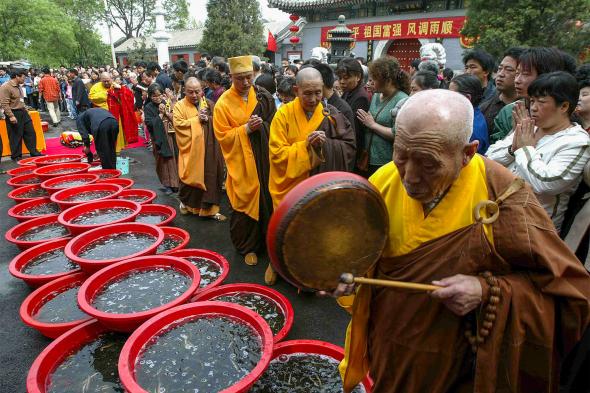Start your spiritual journey: what to expect from a Buddhist retreat

Retreats are a great way to start a personal exploration of Buddhism and yourself. The thousands of Buddhist dharma centers and monasteries that have sprung up in the West offer many types of retreats for Buddhist neophytes.
There are "introduction to Buddhism" weekends, seminar retreats focused on a Zen art such as haiku or kung fu; family retreats; retires to the desert; retreats for silent meditation. You can go to a distant and exotic place for a pickup, but there may be pickups within a short drive from your home.
Attending a beginner retreat is the ideal way to start a personal Buddhist experience outside of books. You will be in the company of other beginners and topics such as temple protocols or how to meditate will be explained. Most Buddhist centers offering retreats will clarify which retreats are appropriate for beginners and which require some prior experience.
What to expect from a Buddhist retreat
Let's start with the downsides. Keep in mind that a monastery is not a spa and that your accommodations are unlikely to be luxurious. If having a room is a bargain, find out if it's possible before registering. It is possible that you are sharing bathroom facilities with other retreats. Also, some monasteries may expect them to help you with household chores - cooking, washing dishes, cleaning - while you stay there. Monks with ringing bells can walk into the halls before dawn to call you to a meditation or dawn song service, so don't count on sleeping.
Also be warned that you would probably expect to take part in the religious observances of the monastery or temple. Postmodern Westerners often hate rituals and strongly resist their participation. After all, you signed up to learn tai chi or to communicate with the Great Anything, not to sing alien liturgy or to pay homage to golden Buddha figures.
The ritual is part of the Buddhist experience, however. Read the ritual and Buddhism before excluding Buddhist retreats because you may have to participate in a ritual.
On the plus side, if you take the spiritual path seriously, there is no better way to start than with a beginner Buddhist retreat. On retreat, you can find a greater depth and intensity of spiritual practice than you may have experienced before. You will be shown the facets of reality, and of yourself, which may surprise you. My Buddhism practice began 20 years ago with a beginner retreat that I am infinitely grateful for.
Where to find Buddhist retreats
Finding Buddhist retreats is, unfortunately, a challenge. There is no one-stop directory to easily find out what is available.
Start your search with the Buddhanet World Buddhist Directory. You can search for monasteries and dharma centers by sect or location and then visit individual websites to see the retreat schedule for each monastery or center. You can also find retreats advertised in Buddhist publications such as the Tricycle or the Sun Shambhala.
Please note that in some spiritual magazines or websites you can find advertisements for spiritual retreat centers that give the impression of being Buddhist, but are not. That doesn't mean those retreat centers aren't lovely places to visit, just that they're not Buddhists and won't give you an authentic Buddhism experience if that's what you're looking for.
Don't accept substitutes!
Unfortunately, there are some well-known, or at least well publicized, "Buddhist" teachers who are fraudulent. Some of them have great followers and beautiful centers, and what they teach can have some value. But I doubt the character of someone who calls himself a "Zen teacher", for example when they have little or no training in Zen.
How can you tell who it really is and who it isn't? An authentic Buddhist teacher will be very direct on where he was educated in Buddhism. Furthermore, the lineage of teachers is vital in many Buddhist schools, such as Tibetan and Zen. If you ask about a Tibetan teacher guru or Zen teacher teacher, you should get a very clear and specific answer that can probably be verified through a web search. If the answer is vague or if the application is rejected, keep your wallet in your pocket and move on.
In addition, an authentic Buddhist retreat center will almost always be part of at least one well-defined and established tradition. There are some "fusion" centers that combine more than one tradition, but those will be very specific, not a vague, generic Buddhism. If you are looking at a Tibetan center, for example, the center should be very clear on which Tibetan tradition is followed there and which gurus have taught the teachers.
Advanced Buddhist retreats
You may have read or heard of advanced meditation retreats or retreats of several weeks up to three years. You may think you don't need to start swimming in the lower part of the pool and you are ready to dive into the deepest part. But if you have no previous experience with Buddhist retreats, you should really start with a beginner retreat. Indeed, many Dharma centers will not allow you to sign up for an "intensive" retreat without previous experience.
There are two reasons for this. First, the intensive retreat is very likely to be different from what you imagine. If you get into one unprepared, you may have a bad experience. Secondly, if you are absolutely unhappy or stumble upon not understanding the forms and protocols, this can have an impact on withdrawal for everyone else.
Get away from it all
A spiritual retreat is a personal adventure. It's a small time commitment that affects the rest of your life. It is a space in which to exclude noise and distractions and confront yourself. It may be the beginning of a new direction for you. If you are interested in Buddhism and want to be more of a "library Buddhist", we recommend that you find and participate in a beginner level retreat.